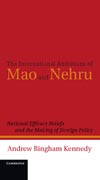
The International Ambitions of Mao and Nehru: National Efficacy Beliefs and the Making of Foreign Policy
Kennedy, Andrew
Why do leaders sometimes challenge, rather than accept, the international structures that surround their states? In The International Ambitions of Mao and Nehru, Andrew Kennedy answers this question through in-depth studies of Chinese foreign policy under Mao Zedong and Indian foreign policy under Jawaharlal Nehru. Drawing on international relations theory and psychological research, Kennedy offers a new theoretical explanation for bold leadership in foreign policy, one that stresses the beliefs that leaders develop about the 'national efficacy' of their states. He shows how this approach illuminates several of Mao and Nehru's most important military and diplomatic decisions, drawing on archival evidence and primary source materials from China, India, the United States and the United Kingdom. A rare blend of theoretical innovation and historical scholarship, The International Ambitions of Mao and Nehru is a fascinating portrait of how foreign policy decisions are made. INDICE: 1. Introduction; 2. National efficacy beliefs and foreign policy; Part I. Mao's China: 3. Same revolution, different dreams; 4. Mao's adventure in Korea; 5. Persistent pugnacity; Part II. Nehru's India: 6. Gandhi's dissimilar disciples; 7. Nehru's misstep in Kashmir; 8. Determined diplomacy; 9. Conclusion.
- ISBN: 978-0-521-19351-1
- Editorial: Cambridge University Press
- Encuadernacion: Cartoné
- Páginas: 272
- Fecha Publicación: 29/12/2011
- Nº Volúmenes: 1
- Idioma: Inglés
